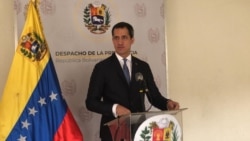The United States is prepared to end sanctions on Venezuela if its political leaders agree to support a proposal to form a temporary government.
U.S. officials say the proposal would require both Venezuelan President Nicolas Maduro and opposition leader Juan Guaidó to step aside. Instead, a five-person council would govern the country.
U.S. Secretary of State Mike Pompeo announced the proposal earlier this week. It is similar to a plan offered last weekend by Guaidó. About 60 countries recognize him as Venezuela’s rightful leader.
The proposal shows how growing concerns about the coronavirus and its spread threaten to overpower the South American nation. Venezuela’s healthcare system and economy are already weak, U.S. officials say.
"This framework can provide a path that ends the suffering and opens the path to a brighter future for Venezuela," said Pompeo on Tuesday. He spoke to reporters in Washington.
Under the proposal, both Maduro and Guaidó would step aside and give power to a five-member council of state, which would govern the country. The group would rule until presidential and parliamentary elections can be held within six to 12 months.
The military high command is the traditional arbiter of political disputes in Venezuela. It has been providing support to Maduro. Under the proposal, the military command would remain in place while the temporary government is in power.
Four of the council’s members would be appointed by the opposition-controlled National Assembly that Guaidó leads. To gain support from the ruling socialist party, a two-thirds majority would be required. The fifth member would serve as acting president until elections are held. That person would be named by the council’s other members. Neither Maduro nor Guaidó would serve on the council. However, Pompeo told reporters that under the plan, Guaidó would be free to run for president when elections are held.
"The hope is that this setup promotes the selection of people who are very broadly respected and known as people who can work with the other side," said Elliott Abrams. He spoke to The Associated Press.
Abrams is the U.S. Special Representative for Venezuela.
The plan also describes for the first time U.S. requirements for lifting sanctions against Maduro, his top aides and the country’s oil industry. That industry now provides nearly all of Venezuela's foreign income.
The U.S. sanctions would stay in place against people accused of serious human rights abuses and drug trafficking. However, individuals who face restrictions because of their positions inside the Maduro government would be helped. These include members of the supreme court, electoral council and constitutional assembly members.
However, for sanctions to end, Abrams said, the council would need to work well and all foreign military forces — from Cuba or Russia — would need to leave Venezuela.
For months, the U.S. government has used economic and diplomatic pressure to try to break the military's support for Maduro. Last week, U.S. government lawyers brought charges of drug trafficking and money laundering against Maduro and other government officials. They include the defense minister and head of the supreme court.
Yet a power-sharing agreement is unlikely to win Maduro's support unless his future includes protection from the U.S. justice system, David Smilde said. He is with the Washington Office on Latin America, a research group.
"It's a little hard to see how this is going to be convincing to the major players in the government," he said. It also would require the support of Cuba, China or Russia -- all of which support Maduro.
A top Trump administration official said Monday that the United States is willing to negotiate with Maduro about terms for his leaving.
Last September, Guaidó proposed a similar transitional government in talks with Maduro officials. But the plan failed to win much acceptance.
I’m Anna Mateo.
The Associated Press reported this story. Mario Ritter Jr. adapted this story for VOA Learning English. George Grow was the editor.
_________________________________________________
Words in This Story
sanction – n. threatened punishment for disobeying a rule or law
framework – n. a set of ideas meant to be developed into a more complete plan
arbiter – n. a person who can settle arguments
selection – n. the act of choosing something or someone from a group
aide – n. a person who acts as an assistant
promote – v. to support
income – n. earnings; wages
money laundering – n. the illegal process of hiding money passed to an individual or organization through a complex series of financial activities
convince – v. to persuade; to cause someone to accept or believe something






